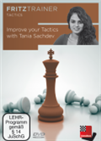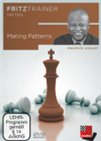Bronze Horsemen: A Petersburg Tale
Many of the teams at the European Club Cup have been presenting similar line-ups throughout the years, and one of them is Mednyi Vsadnik — a team with a very well-defined identity. The name of the squad comes from a narrative poem by Alexander Pushkin, The Bronze Horseman: A Petersburg Tale, one of the most influential works in Russian literature. A national epic, the book recounts how the establishment of the city of Saint Petersburg "opened a window to Europe".
With the connection to Europe established, almost 200 years after the book was written, a chess team travelled to Greece and defeated a highly competitive field. These were the final round pairings at the top, with no less than five teams fighting for gold:
| 1 |
4 |
|
Mednyi Vsadnik St.Petersburg |
10 |
|
: |
|
11 |
Valerenga Sjakklubb |
|
5 |
| 2 |
6 |
|
Obiettivo Risarcimento Padova |
10 |
|
: |
|
10 |
Molodezhka |
|
7 |
| 3 |
3 |
|
Odlar Yurdu |
9 |
|
: |
|
10 |
AVE Novy Bor |
|
2 |
Two recurring storylines of the tournament converged on the first board of the top match: the looming threat of Magnus Carlsen losing his number one spot in the rankings before the World Championship match and Peter Svidler's mystifying streak of bad results — the Russian GM lost four games in a row before beating Erik Blomqvist (258 points lower-rated than him) in round six. Svidler had White. If anyone ever had an edge in the game it was Svidler. This was the position after 36 moves:
White has a spatial advantage and a bishop against a knight, which might be favourable in an endgame with play on both flanks. These slight differences might be enough for a club player to swindle a friend, but not to defeat the World Champion. On move 58, the draw was signed.

Carlsen unexpectedly used the Caro-Kann Defence | Photo: Niki Riga
The wins for the Bronze Horsemen came on boards three and five. First, Maxime Rodshtein took immediate advantage of a huge blunder by Valerenga's fifth round hero Borki Predojevic:
 The aim of this course is to help you understand how to make tactical opportunities arise as well as to sharpen your tactical vision - these selected lectures will help to foster your overall tactical understanding.
The aim of this course is to help you understand how to make tactical opportunities arise as well as to sharpen your tactical vision - these selected lectures will help to foster your overall tactical understanding.
Predojevic did not notice that the knight defends White's queen from e1 and went for 24...Ne4??, counting on a no-longer-existing "pin" on the c-file — the game finished after 25.Bxb4, as Rodshtein simply gained a free piece.

By this time, the two top boards from Valerenga probably already knew the match was practically lost | Photo: Niki Riga
Valerenga's hopes for a comeback were crushed by Vladimir Fedoseev's win over Nils Grandelius in 40 moves. Fedoseev was a key figure for Mednyi Vsadnik: he took an individual gold medal after finishing on 6/7 on board three.

Individual and team gold for Fedoseev | Photo: Niki Riga
Boards two and four of the team from Saint Petersburg also won individual gold medals, as both Nikita Vitiugov and Maxim Matlakov ended up with undefeated 5/6 scores. This proves how strong the team actually was — in fact, they only lost one game throughout the event...if we ignore Svidler's four losses in a row. Peter made use of his self-deprecating sense of humour to celebrate his team's win (without losing sight of his disappointing performance):

Svidler gave a speech with FIDE Presidente Arkady Dvorkovich present in the closing ceremony | Photo: Niki Riga
The eventual champions were not the only ones to finish with 12/14 match points, however. The second-seeded AVE Novy Bor defeated Odlar Yurdu 4:2 to get silver medals. Both Czech players in the line-up — David Navara and Viktor Laznicka — won in the last round to boost the result of their country's team. Navara defeated Rauf Mamedov, who chose not to defend passively when that is precisely what was needed:
The Azeri player went for 26.Qf4 giving way to 26...Bxg2, relying on the tactic 27.Rxe6 fxe6 28.Qxf8. However, Black's attack with the queen and bishop proved to be decisive in the following moves. As it usually happens in team events, Mamedov only resigned on move 38, with mate-in-four on the board:
 On this DVD, Grandmaster and worldrenowned commentator Maurice Ashley reviews some of the most interesting patterns with examples meant to educate and entertain.
On this DVD, Grandmaster and worldrenowned commentator Maurice Ashley reviews some of the most interesting patterns with examples meant to educate and entertain.

David Navara finished the event on 4½/6 | Photo: Niki Riga
No less than four teams tied for 3rd-6th on 11/14 match points. The bronze medals finally went to Molodezhka, a Russian team that sent a group of youngsters led by the experienced Vladimir Potkin. No player really stood out in the squad, but they all had good performances, as Potkin was the only one to lose rating points (a mere 0.3 points) — the biggest gain was achieved by Daniil Yuffa, who defeated Julio Granda with White in the final round:
White has had a clear advantage for over ten moves, and it was time for Yuffa to close the deal. He did it with 42.Qd6, a move that highlights the vulnerability of Black's king.

Bronze also went to a Russian team, as Molodezhka edged their rivals on tiebreaks | Photo: Niki Riga
As a last remark, we should mention that Magnus Carlsen managed to retain the number one spot in the ratings list. However, it is very telling that, with only a couple of weeks left before the World Championship match, Fabiano Caruana is a mere 2.4 points behind the Norwegian — an ideal setup for what seems will be a very exciting match!
 Scarcely any world champion has managed to captivate chess lovers to the extent Carlsen has. The enormously talented Norwegian hasn't been systematically trained within the structures of a major chess-playing nation such as Russia, the Ukraine or China.
Scarcely any world champion has managed to captivate chess lovers to the extent Carlsen has. The enormously talented Norwegian hasn't been systematically trained within the structures of a major chess-playing nation such as Russia, the Ukraine or China.
Still number one | Photo: Niki Riga
Final standings (top 20)
| 1 |
4 |
|
Mednyi Vsadnik St.Petersburg |
7 |
6 |
0 |
1 |
12 |
229,5 |
30,5 |
| 2 |
2 |
|
AVE Novy Bor |
7 |
5 |
2 |
0 |
12 |
217,5 |
30,0 |
| 3 |
7 |
|
Molodezhka |
7 |
5 |
1 |
1 |
11 |
231,0 |
31,0 |
| 4 |
6 |
|
Obiettivo Risarcimento Padova |
7 |
4 |
3 |
0 |
11 |
228,0 |
29,0 |
| 5 |
5 |
|
Valerenga Sjakklubb |
7 |
5 |
1 |
1 |
11 |
219,5 |
26,0 |
| 6 |
1 |
|
Alkaloid |
7 |
5 |
1 |
1 |
11 |
219,0 |
30,0 |
| 7 |
9 |
|
Itaka |
7 |
5 |
0 |
2 |
10 |
184,0 |
27,0 |
| 8 |
27 |
|
CC Gambit Asseco SEE |
7 |
4 |
2 |
1 |
10 |
136,5 |
23,0 |
| 9 |
3 |
|
Odlar Yurdu |
7 |
4 |
1 |
2 |
9 |
209,0 |
30,5 |
| 10 |
8 |
|
Beer Sheva Chess Club |
7 |
4 |
1 |
2 |
9 |
176,5 |
26,5 |
| 11 |
15 |
|
Dunajska Streda |
7 |
4 |
1 |
2 |
9 |
157,5 |
22,5 |
| 12 |
22 |
|
Nordstrand Sjakklubb |
7 |
4 |
1 |
2 |
9 |
155,5 |
23,5 |
| 13 |
24 |
|
BSG |
7 |
3 |
3 |
1 |
9 |
151,0 |
24,0 |
| 14 |
14 |
|
Schachgesellschaft Solingen |
7 |
3 |
3 |
1 |
9 |
149,0 |
24,0 |
| 15 |
12 |
|
Schachfreunde Berlin 1903 |
7 |
4 |
1 |
2 |
9 |
135,0 |
22,5 |
| 16 |
21 |
|
Eynatten |
7 |
4 |
1 |
2 |
9 |
130,5 |
21,0 |
| 17 |
16 |
|
DJK Aufwaerts Aachen |
7 |
4 |
0 |
3 |
8 |
164,5 |
25,0 |
| 18 |
11 |
|
KGSRL |
7 |
3 |
2 |
2 |
8 |
160,0 |
22,0 |
| 19 |
10 |
|
SV Werder Bremen |
7 |
3 |
2 |
2 |
8 |
147,5 |
23,0 |
| 20 |
13 |
|
Sloven Ruma |
7 |
3 |
2 |
2 |
8 |
147,0 |
26,0 |
Games from Round 7
Cercle d'Escacs de Monte-Carlo barely grab gold
There were two teams that clearly dominated the women's section from day one: Nona and Monte-Carlo. Therefore, their direct encounter in the knockout final created a lot of expectations. In order to recount what happened in the match, let us read a section of the women's tournament regulations:
In the case of draw in the knock-out match, the winner will be a team who achieved better result on the first board, than in case of draw, better result on the second board and so on. In case of four draws, a biltz match will be played with the rate of play 3 minutes + 2 second per player. In case of a draw in the first blitz match, the second blitz match will be played and so on, to determine the final winner of the match.
In the final match, Nona's Nino Batsiashvili defeated an in-form Pia Cramling (the Swedish GM finished on 5½/7) from what seemed to be a balanced endgame with rooks and bishops. However, Anna Muzychuk’s victory on board one was enough to give Monte-Carlo first place, despite the match ending in a draw — as stipulated by the rules.
Muzychuk had a clear advantage, but Nana Dzagnidze naturally kept on fighting, praying for a miracle. Nana, with Black, went all-in looking for a perpetual:
Black played 35...Nf3+, and after 36.Kh1 she gave up her knight with 36...Rh8. Muzychuk correctly calculated that her king could escape the checks and played 37.gxf3. Black infiltrated with her queen and rook, but White's king finally found shelter:
 Dynamic play is what makes your chess effective and most importantly fun! Timur Gareyev shows severeal examples which aspects are important to remember when seizing for the initiative!
Dynamic play is what makes your chess effective and most importantly fun! Timur Gareyev shows severeal examples which aspects are important to remember when seizing for the initiative!
Dzagnidze resigned after 42.Kc1.

The final match | Photo Niki Riga

The happy winners: Almira Skripchenko, Deimante Cornette, Monika Socko, Pia Cramling and Anna Muzychuk | Photo: Niki Riga
The match for third place between SSHOR and Ugra also finished tied, but with all the games drawn! Therefore, the teams had to go to a blitz tiebreak, which was won 2½:1½ by Ugra, with wins by Anna Ushenina and Baira Kovanova.

Ugra took bronze after winning a blitz playoff | Photo: Niki Riga
Final standings
Games from Round 7
Links
























